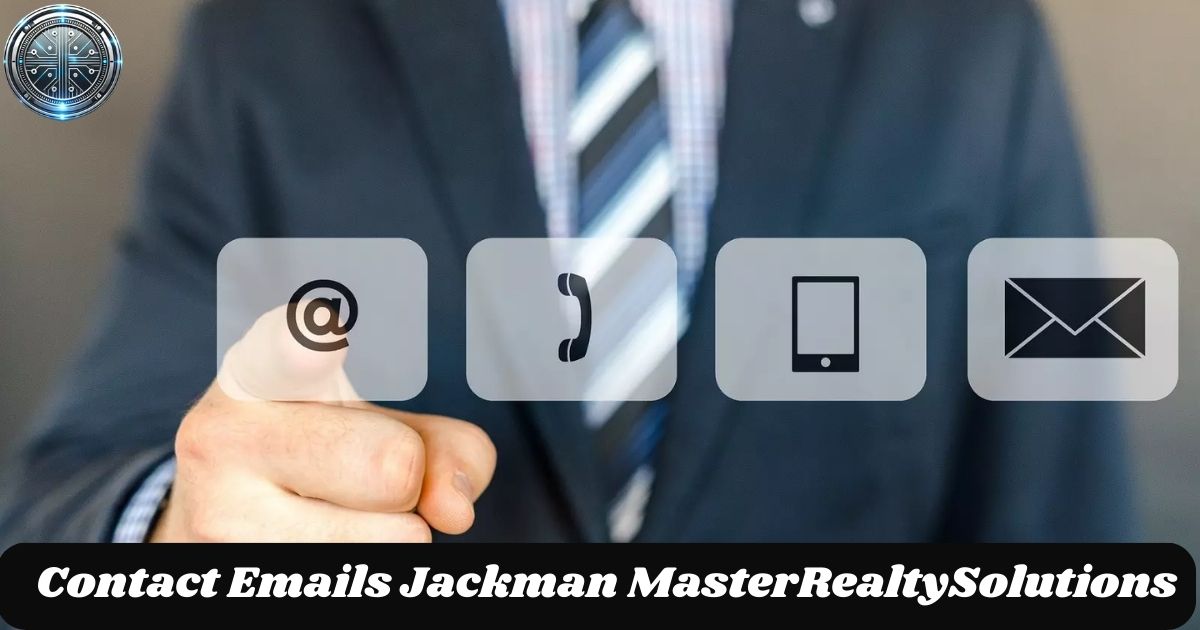In real estate, effective communication is the key to building trust and closing deals. Contact emails play a crucial role in connecting agents, buyers, and investors, ensuring smooth transactions and timely updates. A well-crafted email can provide essential property details, schedule meetings, and address client concerns—all while maintaining a professional image. Now we will explore in this article Contact Emails Jackman MasterRealtySolutions.
Beyond just messaging, emails streamline operations and improve customer engagement. They allow real estate businesses to nurture leads, send market insights, and keep clients informed throughout the buying or selling process. By using the right email strategies, agents can enhance professionalism, strengthen relationships, and drive business growth.
The Role of Contact Emails in Real Estate
Contact emails are a vital communication tool in the real estate industry. They serve as a direct link between agents, clients, and business partners, ensuring seamless interactions. A well-crafted email can build trust, maintain professionalism, and drive real estate transactions.
Beyond just communication, contact emails help businesses automate processes, track client inquiries, and provide instant responses. With real estate being time-sensitive, prompt and structured email communication makes a significant difference.
The Importance of Contact Emails in Real Estate
In real estate, decisions happen fast, and clear communication is crucial. Emails provide a reliable and documented channel for handling client inquiries, property updates, and legal transactions. They ensure both parties have a record of agreements, reducing misunderstandings.
Additionally, emails allow real estate professionals to nurture leads, schedule viewings, and negotiate deals effectively. A well-structured email strategy can turn potential buyers into long-term clients.
How Contact Emails Help in Building Client Relationships
Client relationships thrive on consistent and transparent communication. Emails enable agents to stay in touch with clients, providing updates on property availability, market trends, and transaction progress.
A personalized email makes clients feel valued. Addressing them by name and referencing their specific interests can enhance engagement and increase the likelihood of closing a deal.
Enhancing Professionalism Through Effective Email Communication
A poorly written email can harm an agent’s credibility. Using clear, concise language and professional formatting reflects expertise and trustworthiness. Clients are more likely to engage with agents who communicate in a structured and respectful manner.
Real estate professionals should also use branded email addresses and signature blocks to reinforce credibility. This helps in establishing a recognizable and reputable presence in the industry.
Streamlining Operations with Well-Managed Emails
Emails help in organizing and streamlining real estate operations, from scheduling property tours to sending contracts. Automated responses ensure timely replies, reducing delays in client communication.
A structured email system minimizes errors and enhances productivity, allowing real estate businesses to focus on sales and client service rather than administrative tasks.
Read more: Online Event of the Year TheHakevent: The Ultimate 2025 Virtual Experience
Best Practices for Crafting Impactful Contact Emails
Using a Clear Subject Line for Better Engagement
The subject line is the first thing a recipient sees. A vague or misleading subject may result in the email being ignored. Keep it precise, such as “Exclusive Property Listing – Limited Time Offer.”
A well-crafted subject line ensures higher open rates and immediate client attention, making it a crucial part of email success.
Personalizing the Message for Stronger Connections
Generic emails often go unread. Personalizing the message by addressing the recipient’s name and mentioning their property interests shows attentiveness.
Personalization makes emails more engaging and effective, increasing the chances of client interaction and response.
Keeping Emails Concise and Focused
Long, cluttered emails lose a reader’s attention. Keep the message direct and relevant to ensure easy readability. Use bullet points or short paragraphs for better clarity. A concise email respects the client’s time, allowing them to grasp important details quickly without feeling overwhelmed.
Including a Clear Call to Action (CTA)
Every email should guide the recipient towards an action, whether scheduling a call, visiting a listing, or signing a document. Clear CTAs like “Book a Viewing Today” increase engagement. A well-placed CTA improves response rates and ensures clients take the next step without confusion.
Leveraging Professional Email Design for Better Readability
A well-designed email with structured formatting, professional fonts, and images enhances readability. Clients are more likely to engage with emails that look polished and appealing.
Using branded templates and mobile-friendly designs also ensures that emails maintain their impact across all devices.
Essential Contact Emails for Jackman MasterRealty Solutions
Welcome Emails for New Clients
A welcome email sets the tone for future communication. It should introduce the real estate company, highlight services, and provide a direct contact point for inquiries. A warm and informative welcome message builds immediate trust with new clients.
Property Listings Updates for Buyers and Investors
Buyers rely on timely property updates to make quick decisions. Regular listing emails should include clear property descriptions, high-quality images, and pricing details. These emails help investors stay ahead of market opportunities and take immediate action.
Transaction Updates for Smooth Real Estate Deals
Real estate transactions involve multiple steps. Sending clients updates on contract progress, payment deadlines, and legal documentation keeps them informed. Proactive communication reduces uncertainty and builds confidence throughout the transaction process.
Market Insights to Keep Clients Informed
Clients appreciate expert advice. Market insight emails with trends, forecasts, and investment opportunities position the company as a trusted resource. Sharing valuable information helps clients make informed buying and selling decisions.
Follow-Up Emails for Continued Engagement
Following up after property showings or inquiries reminds clients of available options and encourages action. These emails should be friendly, engaging, and solution-focused. A timely follow-up can turn a hesitant buyer into a committed client.
Tools and Technologies for Managing Contact Emails
Email Marketing Platforms for Efficient Outreach
Platforms like Mailchimp and Constant Contact allow real estate businesses to send mass emails while maintaining personalization. They help in segmenting contacts and tracking responses. These tools enhance email marketing strategies and improve engagement rates.
CRM Systems for Organized Client Management
A Customer Relationship Management (CRM) system stores client interactions, tracks email responses, and helps agents nurture leads. CRMs streamline operations and prevent lost communication opportunities.
Mobile-Friendly Design Tools for Accessible Communication
With most clients reading emails on mobile devices, responsive email design is essential. Tools like Litmus ensure emails look great across all screen sizes. A mobile-friendly email enhances readability and boosts engagement.
Measuring the Success of Contact Emails
Tracking Open Rates for Email Effectiveness
Open rates indicate how many recipients are actually reading emails. A low open rate suggests weak subject lines or poor timing.
By analyzing open rates, real estate businesses can refine their strategies and increase engagement with better email optimization.
Monitoring Click-Through Rates (CTR) for Engagement Levels
CTR measures how many recipients click on links within emails. High CTR means the content is relevant and compelling.
To improve CTR, emails should include clear CTAs, visually appealing links, and engaging property images.
Evaluating Conversion Rates for Business Growth
Conversion rates show how many recipients take action, such as scheduling a property tour or making an inquiry. A low conversion rate may indicate ineffective CTAs or unclear messaging.
Optimizing email structure and personalization can increase conversions and lead to higher sales.
Analyzing Feedback and Engagement for Continuous Improvement
Encouraging clients to respond to emails provides valuable insights into their preferences and concerns. Surveys and feedback forms help in refining email strategies. A client-focused approach ensures that emails remain effective and relevant.
Read more: GameStop NFT Octoberirwindecrypt: The Future of Gaming, Blockchain, and Digital Ownership
Overcoming Common Challenges in Email Communication
Avoiding Spam Filters for Better Email Deliverability
Emails flagged as spam never reach the recipient. Using professional language, avoiding excessive capital letters, and including opt-out options help prevent emails from being marked as spam. A verified business email domain improves credibility and deliverability rates.
Balancing Email Frequency to Prevent Overloading Clients
Too many emails can annoy clients, while too few may result in lost opportunities. A well-planned schedule ensures consistent engagement without overwhelming recipients.
Finding the right balance enhances client trust and responsiveness.
Scaling Personalization for Mass Communication
Sending personalized emails at scale is challenging. CRM tools and email automation help customize messages while reaching a large audience.
A balance of automation and human touch ensures emails remain relevant and engaging.
Contacting Jackman MasterRealty Solutions
Available Contact Emails for Different Needs
Jackman MasterRealty Solutions offers dedicated contact emails for different inquiries:
- General Inquiries: For basic questions about services and properties.
- Customer Support: For assistance with ongoing transactions.
- Sales and Partnerships: For business collaborations and property deals.
Using the correct contact email ensures faster responses and better service.
How to Find the Correct Contact Email
Visiting Their Official Website for Verified Information
The company’s website is the most reliable source for official contact details. Always check the “Contact Us” page for updated email addresses.
Checking Social Media Channels for Direct Contact Options
Many real estate businesses share email contacts on their social media profiles. Platforms like LinkedIn, Facebook, and Instagram often provide direct communication options.
Using Business Directories for Reliable Email Addresses
Professional directories like Zillow, Realtor.com, and business listings feature verified email contacts for real estate companies.
Tips for Writing an Effective Email to Jackman MasterRealty Solutions
Using a Clear Subject Line for Quick Recognition
A well-defined subject line ensures that the email stands out in a crowded inbox. Example: “Interested in Luxury Properties – Inquiry.”
Addressing the Right Department for Faster Response
Emails should be directed to the correct department to avoid delays. Sending a sales-related inquiry to customer support may lead to miscommunication.
Being Concise and Clear in Your Message
Clients and businesses appreciate brief yet informative emails. Avoid unnecessary details and focus on the purpose of the email.
Attaching Supporting Documents When Necessary
Attachments such as property details, legal forms, and identification documents streamline communication and reduce follow-ups.
Benefits of Using Email Communication
Convenience in Reaching Out Anytime
Emails allow clients to send inquiries at their convenience without the pressure of immediate responses.
Record-Keeping for Future Reference
Every email sent serves as a written record of agreements, negotiations, and property details, reducing disputes.
Accessibility for Clients and Businesses
Emails bridge the gap between agents and clients, allowing communication from anywhere in the world.
Common Mistakes to Avoid When Contacting Jackman MasterRealty Solutions
Sending Emails to the Wrong Address
Misrouted emails cause delays and miscommunication. Always verify the correct contact email before sending.
Writing Vague Messages That Lack Clarity
Emails should be precise and to the point. Example: Instead of “I need info,” say “I am interested in a 3-bedroom property in downtown.”
Ignoring Follow-Ups and Losing Opportunities
If there is no response, a polite follow-up email after 48-72 hours increases the chances of engagement.
What to Expect After Sending an Email
Response Time and Acknowledgment
Most businesses aim to respond within 24-48 hours, depending on the nature of the inquiry.
Next Steps in the Communication Process
After sending an email, clients should be prepared to provide additional details or schedule a follow-up call if needed.
Alternatives to Email Communication
Phone Support for Immediate Assistance
For urgent inquiries, calling the company ensures faster responses than waiting for an email reply.
Live Chat for Quick Queries
Many real estate businesses offer live chat features on their websites for instant communication.
In-Person Visits for Personalized Service
Visiting the office allows face-to-face discussions for complex transactions.
Privacy and Security Concerns in Email Communication
Avoiding Sharing Sensitive Information Over Email
Never send confidential details like bank account numbers or personal identification documents via email.
Verifying Email Authenticity to Prevent Scams
Always ensure emails come from official business domains and not suspicious-looking addresses.
Why Choose Jackman MasterRealty Solutions?
Expertise and Reputation in the Real Estate Industry
Jackman MasterRealty Solutions is known for its reliability, transparency, and expertise in real estate transactions.
Commitment to Customer-Centric Communication
The company prioritizes clear, efficient, and professional communication, ensuring that clients receive timely and accurate responses.
Conclusion
Contact emails are more than just a means of communication—they are a powerful tool for building relationships, enhancing professionalism, and streamlining real estate operations. When used effectively, they ensure clients receive timely updates, clear information, and a seamless experience throughout their property journey.
By following best practices, utilizing the right tools, and maintaining a professional tone, real estate businesses can maximize engagement and improve client satisfaction. Jackman MasterRealty Solutions sets a strong example by leveraging structured email communication to provide efficient and reliable services, making every interaction meaningful and results-driven.
FAQ’s
How often should real estate businesses send contact emails?
It depends on the purpose—weekly updates for listings, monthly newsletters for insights, and timely follow-ups for client engagement. Consistency without overwhelming clients is key.
What should a real estate email signature include?
A professional email signature should have your name, title, company name, phone number, website, and social media links for easy contact.
How can real estate agents make their emails stand out?
Using compelling subject lines, high-quality visuals, and personalized messages helps grab attention and improve engagement rates.
Are automated emails effective in real estate?
Yes, when done right! Automated emails save time, nurture leads, and ensure consistent communication without losing the personal touch.
What’s the best time to send real estate emails?
Studies show that emails sent on weekdays, especially in the morning or early afternoon, have higher open rates and engagement.











